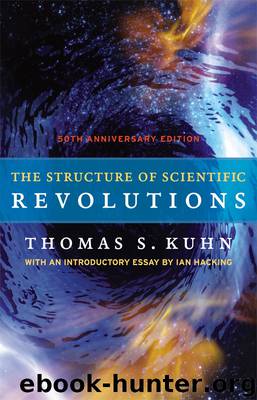The Structure of Scientific Revolutions by Kuhn Thomas S

Author:Kuhn, Thomas S.
Language: eng
Format: epub
Publisher: The University of Chicago Press
Published: 2012-01-09T16:00:00+00:00
[X]
Revolutions as Changes of World View
Examining the record of past research from the vantage of contemporary historiography, the historian of science may be tempted to exclaim that when paradigms change, the world itself changes with them. Led by a new paradigm, scientists adopt new instruments and look in new places. Even more important, during revolutions scientists see new and different things when looking with familiar instruments in places they have looked before. It is rather as if the professional community had been suddenly transported to another planet where familiar objects are seen in a different light and are joined by unfamiliar ones as well. Of course, nothing of quite that sort does occur: there is no geographical transplantation; outside the laboratory everyday affairs usually continue as before. Nevertheless, paradigm changes do cause scientists to see the world of their research-engagement differently. In so far as their only recourse to that world is through what they see and do, we may want to say that after a revolution scientists are responding to a different world.
It is as elementary prototypes for these transformations of the scientist’s world that the familiar demonstrations of a switch in visual gestalt prove so suggestive. What were ducks in the scientist’s world before the revolution are rabbits afterwards. The man who first saw the exterior of the box from above later sees its interior from below. Transformations like these, though usually more gradual and almost always irreversible, are common concomitants of scientific training. Looking at a contour map, the student sees lines on paper, the cartographer a picture of a terrain. Looking at a bubble-chamber photograph, the student sees confused and broken lines, the physicist a record of familiar subnuclear events. Only after a number of such transformations of vision does the student become an inhabitant of the scientist’s world, seeing what the scientist sees and responding as the scientist does. The world that the student then enters is not, however, fixed once and for all by the nature of the environment, on the one hand, and of science, on the other. Rather, it is determined jointly by the environment and the particular normal-scientific tradition that the student has been trained to pursue. Therefore, at times of revolution, when the normal-scientific tradition changes, the scientist’s perception of his environment must be re-educated—in some familiar situations he must learn to see a new gestalt. After he has done so the world of his research will seem, here and there, incommensurable with the one he had inhabited before. That is another reason why schools guided by different paradigms are always slightly at cross-purposes.
In their most usual form, of course, gestalt experiments illustrate only the nature of perceptual transformations. They tell us nothing about the role of paradigms or of previously assimilated experience in the process of perception. But on that point there is a rich body of psychological literature, much of it stemming from the pioneering work of the Hanover Institute. An experimental subject who puts on goggles fitted with inverting lenses initially sees the entire world upside down.
Download
This site does not store any files on its server. We only index and link to content provided by other sites. Please contact the content providers to delete copyright contents if any and email us, we'll remove relevant links or contents immediately.
Good by S. Walden(3559)
The Social Psychology of Inequality by Unknown(3031)
The Checklist Manifesto by Atul Gawande(2854)
0041152001443424520 .pdf by Unknown(2846)
Get What's Yours for Medicare: Maximize Your Coverage, Minimize Your Costs by Philip Moeller(2734)
The Meaning of the Library by unknow(2572)
Guns, Germs and Steel by Diamond Jared(2371)
Borders by unknow(2315)
23:27 by H. L. Roberts(2251)
And the Band Played On by Randy Shilts(2210)
Being Mortal: Medicine and What Matters in the End by Atul Gawande(2129)
A Leg to Stand On by Oliver Sacks(2039)
The Hot Zone by Richard Preston(2019)
More Than Words (Sweet Lady Kisses) by Helen West(1867)
The Valachi Papers by Peter Maas(1860)
The Laws of Medicine by Siddhartha Mukherjee(1803)
The Andromeda Strain by Michael Crichton(1746)
Get What's Yours for Medicare by Philip Moeller(1743)
The Obesity Epidemic by Robyn Toomath(1676)
